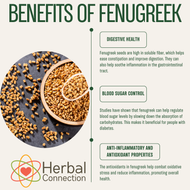Discover the Versatility and Benefits of Fenugreek: Recipes, Health Insights, and More
Posted by Renae Colbert on 31st Jul 2024
Fenugreek, a powerful herb, has been used for centuries in cooking and traditional medicine. Whether you choose organic or conventional fenugreek seeds or powder, incorporating this versatile ingredient into your diet can offer numerous health benefits. In this blog, we'll delve into what makes fenugreek so special, explore its culinary and medicinal uses, and provide two easy recipes for you to try at home.
What is Fenugreek?
Fenugreek, scientifically known as Trigonella foenum-graecum, is a herb native to the Mediterranean region, southern Europe, and western Asia. Its seeds and leaves are commonly used in cooking and traditional medicine. Fenugreek seeds are small, golden-brown, and have a slightly bitter taste, reminiscent of burnt sugar. When ground into a powder, they become a key ingredient in many spice blends, such as curry powder.
Historically, fenugreek has been used by ancient civilizations, including the Egyptians, Greeks, and Romans, for its culinary and medicinal properties. Today, it remains a staple in Indian cuisine and is gaining popularity worldwide for its health benefits.
Health Benefits of Fenugreek
Fenugreek is a nutritional powerhouse. It is rich in fiber, protein, iron, magnesium, and manganese. Here are some key health benefits:
- Digestive Health: Fenugreek seeds are high in soluble fiber, which helps ease constipation and improve digestion. They can also help soothe inflammation in the gastrointestinal tract.
- Blood Sugar Control: Studies have shown that fenugreek can help regulate blood sugar levels by slowing down the absorption of carbohydrates. This makes it beneficial for people with diabetes.
- Lactation Support: Fenugreek is often recommended to nursing mothers as it can help increase milk production. This benefit is attributed to its phytoestrogen content, which mimics the effects of estrogen in the body.
- Anti-inflammatory and Antioxidant Properties: The antioxidants in fenugreek help combat oxidative stress and reduce inflammation, promoting overall health.
- Heart Health: By lowering cholesterol levels and improving blood sugar control, fenugreek can contribute to better heart health.
Scientific studies support many of these claims. For instance, a study published in the Journal of Diabetes and Metabolic Disorders found that fenugreek significantly improved glycemic control in people with type 2 diabetes.
Culinary Uses of Fenugreek
Fenugreek's unique flavor makes it a favorite in various dishes, especially in Indian and Middle Eastern cuisines. It can be used in its whole seed form, as a ground powder, or as fresh leaves. Here’s a delicious recipe to try:
Fenugreek-Infused Chicken Curry
Ingredients:
- 2 tbsp fenugreek seeds
- 1 lb chicken, cut into pieces
- 2 onions, finely chopped
- 2 tomatoes, pureed
- 1 tbsp ginger-garlic paste
- 2 tsp turmeric powder
- 1 tsp red chili powder
- 1 tsp garam masala
- Salt to taste
- 2 tbsp oil
- Fresh coriander leaves for garnish
Instructions:
- Soak the fenugreek seeds in water for about 2 hours.
- Heat oil in a pan and add the soaked fenugreek seeds. Sauté for a few minutes.
- Add onions and cook until golden brown.
- Add the ginger-garlic paste and sauté until the raw smell disappears.
- Add the chicken pieces and cook until they turn white.
- Add the pureed tomatoes, turmeric powder, red chili powder, and salt. Cook until the oil separates.
- Add a cup of water and let it simmer until the chicken is fully cooked.
- Sprinkle garam masala on top and garnish with fresh coriander leaves.
- Serve hot with rice or naan.
Medicinal Uses of Fenugreek
Beyond the kitchen, fenugreek is also valued for its medicinal properties. It is commonly used in traditional medicine to treat various ailments. Here’s a simple medicinal recipe:
Fenugreek Tea for Digestion
Ingredients:
- 1 tsp fenugreek seeds
- 1 cup water
- Honey or lemon (optional)
Instructions:
- Boil the water in a pot.
- Add fenugreek seeds and let them simmer for about 5 minutes.
- Strain the tea into a cup.
- Add honey or lemon for taste, if desired.
- Drink this tea after meals to aid digestion and reduce bloating.
Caution: Who Should Avoid Fenugreek?
While fenugreek is generally safe for most people, it may cause side effects in some. Pregnant women should avoid fenugreek as it can stimulate uterine contractions. Individuals with allergies to peanuts or chickpeas should also exercise caution, as they may have a similar reaction to fenugreek. Additionally, fenugreek can interact with certain medications, so it's advisable to consult with a healthcare provider before adding it to your regimen.
Conclusion
Fenugreek seeds and powder offer a range of health benefits and can be easily incorporated into both culinary and medicinal recipes. Whether you are looking to spice up your meals or improve your health, fenugreek is a versatile ingredient worth exploring. Try out the recipes provided and enjoy the many benefits of this ancient herb.

